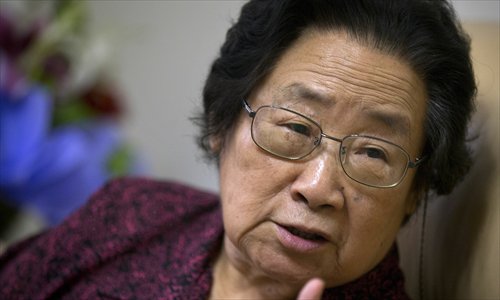Nobel laureate Tu Youyou's team makes breakthrough in artemisinin resistance against malaria
Findings promote industrial development of anti-malaria herb in China

Chinese 2015 Nobel Prize winner in medicine Tu Youyou speaks during an interview in her apartment in Beijing. Photo: AP
A breakthrough has been made in the global fight against malaria by a team of Chinese scientists led by Nobel Prize winner Tu Youyou, media reports said on Monday.
After more than three years' research, Tu's team has proposed that the problem of resistance to the revolutionary medicine - artemisinin - can best be addressed by extending treatment from three to five or even seven days, and the replacement of certain ancillary drugs that are resistant to combination therapy, the Xinhua News Agency reported on Monday.
Widespread resistance to artemisinin has worried scientists around the world. Isolated from the plant Artemisia annua, or sweet wormwood, artemisinin and its derivatives are powerful medicines known for their ability to swiftly reduce the number of plasmodium parasites in the blood of patients with malaria.
The discovery of the anti-malaria compound artemisinin won Tu the 2015 Nobel Prize in Physiology or Medicine.
Artemisinin-based combination therapies are the primary anti-malarial therapies promoted by the World Health Organization (WHO) and the most important global weapon against malaria.
But research has found that in countries in the Greater Mekong subregion, such as Cambodia, Thailand, Myanmar and Vietnam, the parasite in patients who undergo three days' treatment shows signs of generating resistance to artemisinin.
According to the World Malaria Report released by the WHO in November 2018, an estimated 219 million malaria cases occurred worldwide in 2017. Fifteen countries in sub-Saharan Africa as well as India carried almost 80 percent of the global malaria burden.
Scholars reached by the Global Times on Monday said artemisinin is a highly recognized Chinese drug among African people and has become the first choice for the international community in the treatment of malaria.
"It is good news for patients around the world, not just for African people, who can continue relying on artemisinin to treat malaria at a very low cost. Unlike quinine, another anti-malaria drug with strong side effects, artemisinin has none," Ji Aiping, a doctor from the Institute of Tropical Diseases affiliated with Beijing Friendship Hospital, told the Global Times on Monday.
Solving the puzzle of artemisinin resistance is of great significance as artemisinin will continue to be the primary drug to fight malaria, and the low-cost drug is suitable for people living in poverty-stricken Africa, where malaria is rampant, according to Tu's team.
Wang Jigang, a member of Tu's team and also a research fellow at the China Academy of Chinese Medical Sciences' artemisinin research center, told Beijing-based Science and Technology Daily that in the short term it is impossible to find a better drug than artemisinin in terms of effectiveness, safety and drug assistance for the treatment of malaria.
Tu's team also found that artemisinin might be effective against lupus erythematosus, an autoimmune disease in which the body's immune system mistakenly attacks healthy tissues in many parts of the body. A three-phase clinical trial, lasting more than seven years, has been approved by the National Medical Products Administration for 15 Chinese hospitals.
If successful, a tablet is expected to be on the market by 2026, the Xinhua report said.
Market boost
Wang Hui, a research fellow from the Institute of Process Engineering of Chinese Academy of Sciences, told the Global Times on Monday that research on artemisinin resistance is expected to promote the industrial development of artemisinin, including the domestic plantation of the herb.
The 10 artemisinin-related stocks on China's A-share market all surged Monday, with two hitting the daily limit of 10 percent before trading was suspended on Monday.
"We will increase our production capacity for artemisinin according to the demands of the market as artemisinin is also used in fighting other diseases," said Jiang Hongge, manager of Yuzhou Tianyuan Biotechnology Company, an artemisinin company based in Central China's Henan Province.
Most of the sweet wormwood is planted in Hunan and Southwest China's Chongqing. With the help of new technology, the production line for extracting artemisinin has also been expanded to northern China, including Henan Province, Jiang told the Global Times.
The world's total production of artemisinin is about 250 tons: China accounts for 200 tons and Vietnam and Madagascar account for about 20 tons each, the Guangzhou-based magazine South Reviews reported in 2017.
Artemisinin is extracted from a medicinal herb used for more than 2,000 years in treating infectious diseases in China.
China-Africa cooperation
No malaria cases have been reported in China since 2017, indicating that the epidemic has been eradicated in the country, Xinhua reported Monday.
China has continued to carry out research on malaria control and prevention and develop artemisinin-based anti-malarial drugs for the global fight against the disease.
Zhou Haijin, a research fellow from the Institute of African Studies in Zhejiang Normal University, told the Global Times on Monday that China's cooperation on the malaria control and other medical cooperation with African countries is widely recognized by African people and the international community.
Over the past 50 years, about 25,000 Chinese medical personnel have been sent to African countries, covering more than 50 countries and regions in the continent, and treated nearly 270 million African patients.
Newspaper headline: Nobel laureate research team hails ‘progress’ in malaria fight